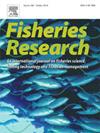Analysis of environmental-economic sustainability of fishing vessels and its improvement by alternative powering options in projected decarbonization scenarios
IF 2.3
2区 农林科学
Q2 FISHERIES
引用次数: 0
Abstract
The fishery sector faces various environmental challenges to ensure its sustainability, particularly regarding Greenhouse Gas (GHG) emissions originating from fishing activities. Several measures are aimed at improving the energy efficiency of vessels, from technical measures (alternative fuels, hull modification and maintenance…) to operative ones (journey planning, draft and trim optimization…) and market based measures (incentives, green shipping practices, carbon taxation, etc). This paper develops an environmental-economic sustainability index to address challenges in assessing the sustainability of fishing fleets. The index considers all costs, revenues, as well as potential carbon taxation, ensuring its applicability across various regions, fishing gear, and fuels. The application of the sustainability index is presented in the case of the Croatian large-scale fishing fleet, using real-time data on fuel consumption and exact data on the catch rate according to the type of fishing gear. The results show that while most vessels operate profitably under current regulations, the inclusion of carbon taxation may make them unsustainable. To examine the possibility of using alternative fuels, a life-cycle cost assessment of battery-, methanol- and biodiesel-powered systems was conducted. The results showed that certain solutions can become sustainable but the catch rate must be taken into account when investigating their applicability. Full electrification, although the most environmentally friendly, requires very high investment costs making it unsustainable without incentives.
脱碳情景下渔船环境经济可持续性分析及替代动力方案改善
渔业部门面临着各种环境挑战,以确保其可持续性,特别是在渔业活动产生的温室气体排放方面。有几项措施旨在提高船舶的能源效率,从技术措施(替代燃料、船体改造和维护……)到操作措施(行程规划、吃水和内饰优化……)和基于市场的措施(激励措施、绿色航运实践、碳税等)。本文开发了一个环境经济可持续性指数,以解决评估捕鱼船队可持续性的挑战。该指数考虑了所有成本、收入以及潜在的碳税,确保其适用于不同地区、渔具和燃料。在克罗地亚大型捕鱼船队的情况下,介绍了可持续性指数的应用,使用燃料消耗的实时数据和根据渔具类型的捕捞率的精确数据。结果表明,虽然大多数船舶在现行法规下运营盈利,但纳入碳税可能会使它们不可持续。为了研究使用替代燃料的可能性,对电池、甲醇和生物柴油供电系统进行了生命周期成本评估。结果表明,某些解决方案可以成为可持续的,但在调查其适用性时必须考虑捕获率。全面电气化虽然最环保,但需要非常高的投资成本,如果没有激励措施,这将是不可持续的。
本文章由计算机程序翻译,如有差异,请以英文原文为准。
求助全文
约1分钟内获得全文
求助全文
来源期刊

Fisheries Research
农林科学-渔业
CiteScore
4.50
自引率
16.70%
发文量
294
审稿时长
15 weeks
期刊介绍:
This journal provides an international forum for the publication of papers in the areas of fisheries science, fishing technology, fisheries management and relevant socio-economics. The scope covers fisheries in salt, brackish and freshwater systems, and all aspects of associated ecology, environmental aspects of fisheries, and economics. Both theoretical and practical papers are acceptable, including laboratory and field experimental studies relevant to fisheries. Papers on the conservation of exploitable living resources are welcome. Review and Viewpoint articles are also published. As the specified areas inevitably impinge on and interrelate with each other, the approach of the journal is multidisciplinary, and authors are encouraged to emphasise the relevance of their own work to that of other disciplines. The journal is intended for fisheries scientists, biological oceanographers, gear technologists, economists, managers, administrators, policy makers and legislators.
 求助内容:
求助内容: 应助结果提醒方式:
应助结果提醒方式:


